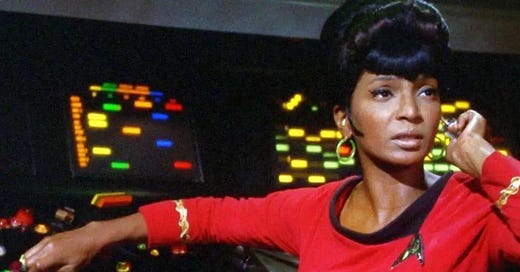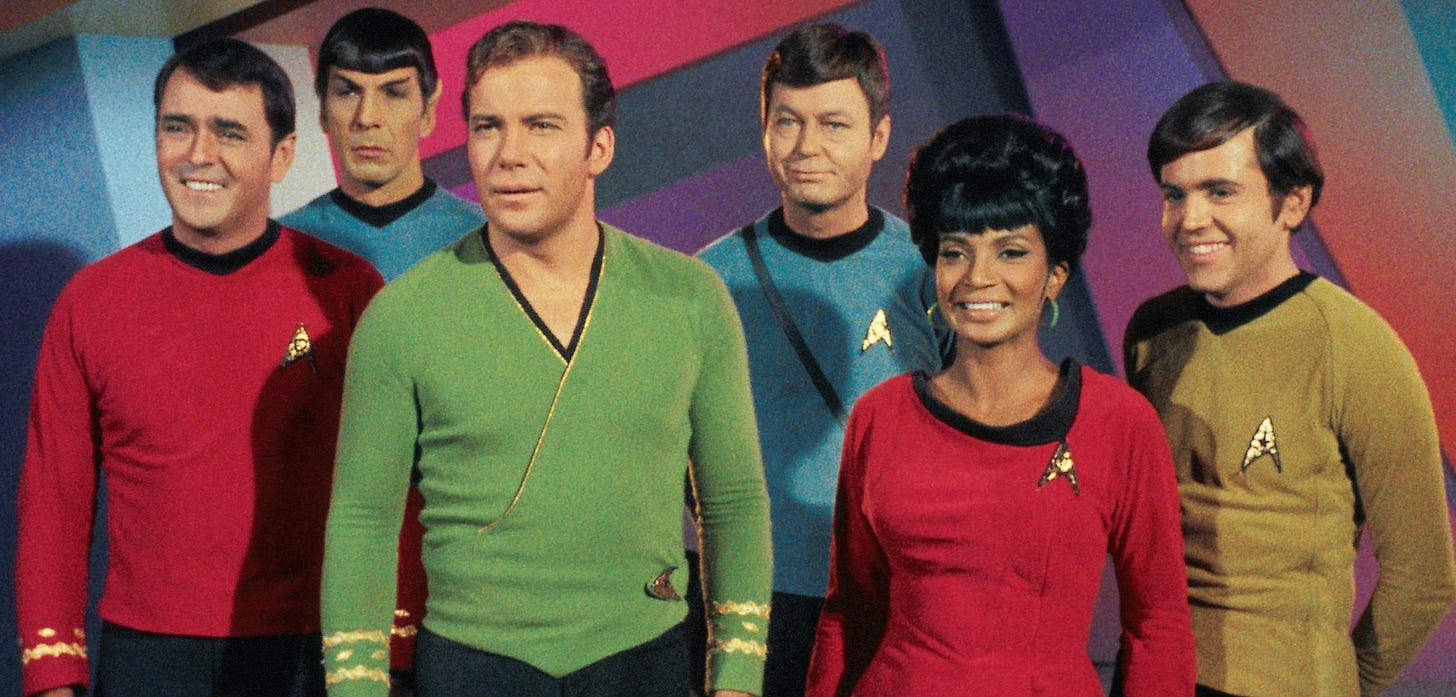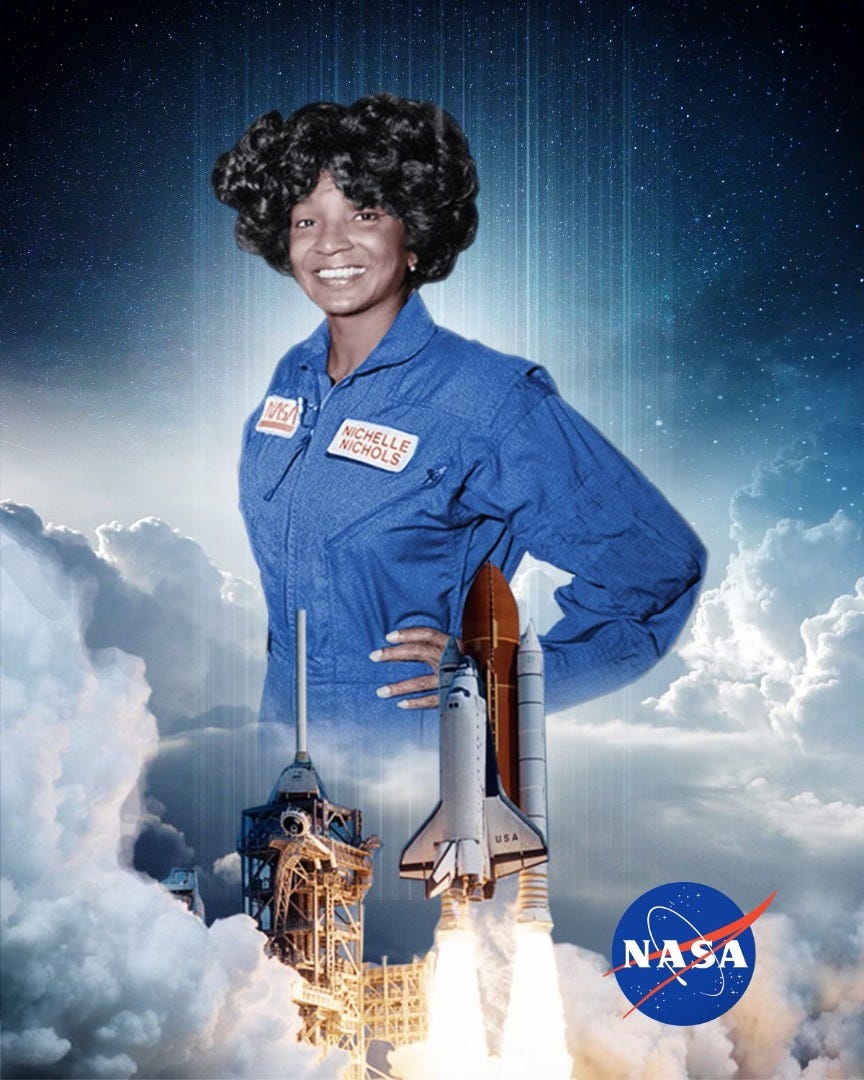Black History Month, Star Trek, And ‘DEI’
Nichelle Nichols and the original series remind us why representation is so important
While Donald Trump and other right-wingers are busy trying to pervert “diversity, equity, and inclusion,” or “DEI” into some kind of slur, the celebration this month of Black History Month seems like a perfect time to not only talk about what the term really means, but how original Star Trek is an object lesson in the true meaning of DEI.
And the late Nichelle Nichols, who played the Black communications officer aboard the starship Enterprise, Lt Uhura, is at the center of that.
Series creator Gene Roddenberry literally built Star Trek around diversity, equity, and inclusion:
Diversity contains as many treasures as those waiting for us on other worlds. We will find it impossible to fear diversity and to enter the future at the same time.
Among Star Trek’s treasures of diversity, Nichelle Nichols is the crown jewel.
An important part of diversity is representation. And nearly 60 years later, Nichols’ portrayal of Uhura as a competent, professional Starfleet officer who is also a Black woman is among one of the most important and lasting examples of the power of representation, and that makes it perhaps the greatest demonstrable impact that the Star Trek franchise has ever made.
Nichols, herself, wasn’t even aware of how influential her work on Star Trek was, until she was ready to walk away from it after the first season.
Please support my work…
Although she was working as an actress in Hollywood, her first love was her previous career as a singer and dancer with musical greats like Duke Ellington and Lionel Hampton.
And she was ready to get back to that when she turned in her resignation to Roddenberry.
But a few days after she quit, she found herself at a Hollywood party, and someone said that her “biggest fan” was also at the party and wanted to meet her.
Nichols was escorted over and found herself face-to-face with the great civil rights leader, Dr Martin Luther King Jr.
He introduced himself, and told Nichols how much his entire family loved Star Trek, as it was the only TV show he and his wife, Coretta, would allow their children to watch past their bedtime.
But King became upset when Nichols told him that she was leaving the series.
“You cannot. You cannot,” she remembered King telling her.
“For the first time on television, we will be seen as we should be seen every day: As intelligent, quality, beautiful people who can sing [and] dance and who can go into space, who can be lawyers, who can be teachers, who can be professors,” Nichols remembered King saying. “And, yet, you don’t see it on television until now.”
King’s words had an impact on Nichols, because she knew that they were true.
“Gene Roddenberry has opened a door for the world to see us. If you leave that door will be closed, because that role is not a Black role, and it’s not a female role. He can fill it with anything — even an alien,” Nichols remembered him continuing, even as she stood there speechless.
You can watch Nichols tell the whole story herself in this video:
“At that moment, the world tilted for me,” she said, and the next week rescinded her resignation and rejoined the cast.
Dr King could not have known just how right he was, because there was a little Black girl growing up in public housing in New York City who watched Star Trek, and when she saw Nichols as Uhura, she exclaimed, “"Ma!! There’s a Black woman on TV and she ain’t no maid!!!”
That little girl, of course, would grow up to be Whoopi Goldberg, who — even as a huge movie star in the 1980s — jumped at the chance to join Star Trek: The Next Generation as the mysterious alien bartender Guinan, to pay tribute to the inspiration she received from the original series decades earlier.
And Goldberg was hardly the only Black girl who Nichols had touched.
That representation meant something special to actress Dawnn Lewis, who would go on to voice the character of Captain Freeman on Star Trek: Lower Decks.
“I saw myself in the show in Nichelle Nichols and saw the possibility of all kinds of different people from all kinds of different places working together, respecting each other, collaborating with each other,” she said in an interview. “And that’s not what I would see when I would watch any other show or particularly the news growing up in, in the sixties.”
Nichols, of course, also would go on to work with NASA, and — again — her representation as a smart, professional Black woman in space touched more lives.
Her work helped recruit Sally Ride, the first American female astronaut, and US Air Force Col Guion Bluford, the first Black astronaut, as well as Dr. Judith Resnik and Dr. Ronald McNair, who both flew successful missions during the Space Shuttle program before their deaths in the Space Shuttle Challenger disaster on January 28, 1986. Recruits also included Charles Bolden, the former NASA administrator and veteran of four shuttle missions, as well as Frederick Gregory, former deputy administrator and a veteran of three shuttle missions.
All of this was possible only because of Nichelle Nichols and Star Trek and the choice to not just pay lip service to diversity, but to show it, week in and week out.
This is true DEI, and that Star Trek helped make diversity, equity and inclusion a reality for so many in the real world is one of greatest accomplishments in the history of the franchise.
Hailing Frequencies Open…
Here’s the latest that we've been keeping up with…
The best Star Trek fan event of the year joyfully celebrates the franchise’s worst episode
We Finally Have A Reason To Be Excited For The Next Star Trek Movie
William Shatner wants to be a part of the special effects of Star Trek
The Doctor Becomes Star Trek: Voyager's Most Important Character Next Year
MOMENT FOR TREK
Star Trek’s Nichelle Nichols on Uhura’s Radical Impact
Enjoy this edition of Subspace Chatter?
Please make sure you …
And also …






